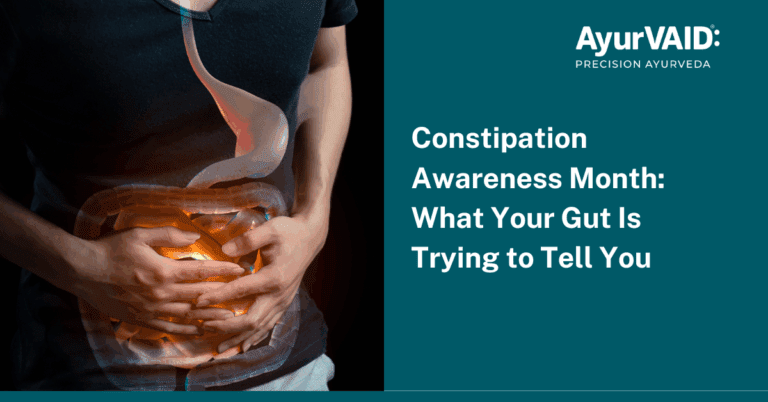Getting up in the morning with a scratchy throat, trouble swallowing or pain every time you speak are all common indicators of tonsillitis. Conventional medicine will quickly jump to antibiotics, and if it recurs, surgery is usually the next line of treatment. However, Ayurveda takes a different approach; it looks deeper than just symptoms and addresses what’s actually causing your body to go off track in the first place.
What is tonsillitis? What causes it? How can Ayurveda provide real and lasting relief from recurrent episodes of tonsillitis? Let’s explore.
What Is Tonsillitis?
Tonsillitis, in a nutshell, is the inflammation of the tonsils, which are two oval-shaped lymph glands located at the back of your throat. These tiny glands are one of the body’s first lines of defence against infections, as they trap bacteria and viruses that enter through the mouth or nose.
When the tonsils are overwhelmed by the infection, they swell, turn red, and may lead to pain or fever, at which point you know something is not quite right. From an Ayurveda viewpoint, tonsillitis is called Tundikeri, which is caused primarily by an imbalance of Kapha and Pitta doshas. Kapha dosha causes congestion, while the Pitta dosha, which represents heat and inflammation, leads to redness and pain in the throat. The imbalance may be triggered by cold weather, over-consumption of cold or fried foods, or low immunity. Learn how to improve your immunity naturally, here.
So, what is tonsillitis, in essence? It’s not just a throat infection; it’s a sign that your body’s internal balance is off.

Tonsillitis Causes Explained
Viruses and bacteria are the leading causes of tonsillitis. But Ayurveda views the disease as an indication of an imbalance of doshas in the body. The three factors, poor lifestyle choices, low immunity, and poor digestion, are usually the ones to blame. Below are the primary tonsillitis causes:
1. Infections: Tonsillitis is usually caused by the Streptococcus bacterium, but other viruses like adenovirus and influenza can lead to it as well.
2. Neglected oral hygiene: The accumulation of bacteria in the mouth over time is a factor associated with throat infections.
3. Exposure to cold and humidity: Eating cold, dry foods and cold wind increases Kapha, which causes swelling and blocking of the throat.
4. Low digestion and low Agni: Impaired digestion results in the build-up of ama, or toxic waste, in the body, which in turn lowers immunity and makes one prone to infection.
5. Anxiety and poor sleeping patterns: Extended periods of stress can weaken the immune system, which often leads to throat infections.
Ayurveda not only treats but also prevents the disorder by focusing on the balance of doshas and the enhancement of Agni. That is because when Agni is functioning well, we become less susceptible to infections.
What Are The Types of Tonsillitis?
Tonsillitis is a condition that can be divided into three primary categories according to its duration and frequency of occurrence:
- Acute Tonsillitis is the most common type, typically lasting no more than two weeks. The most common pathogens causing this condition are bacteria or viruses, and the patient experiences a sudden sore throat, fever, and trouble swallowing as symptoms.
- Chronic Tonsillitis – If there are recurrent infections or long-lasting infections, it is chronic tonsillitis. It causes bad breath and irritates the throat due to its enlargement and trapping of debris.
- Recurrent Tonsillitis – If you suffer from several episodes of tonsillitis each year, it is called recurrent tonsillitis. Inflammation that occurs repeatedly might eventually cause scarring along with a permanent increase in the size of the tonsils.
Ayurveda views these types of tonsillitis in terms of dosha dominance:
- Vata-type shows dryness and roughness in the throat, with mild pain.
- Pitta-type shows redness, fever, and burning pain.
- Kapha-type shows swelling, congestion, and mucus formation.
Understanding the dosha nature helps in personalising treatment for tonsillitis that actually works long-term.
What Is the Treatment for Tonsillitis?
The treatment for tonsillitis in conventional medicine is dependent on the aetiology. Tonsillitis that is viral in nature is considered self-limiting and only requires symptomatic treatment, which consists of rest and hydration, while bacterial tonsillitis will require a course of antibiotics. In chronic cases, surgical management, if required, may be recommended in the form of tonsillectomy. Management of tonsillitis in Ayurveda is focused on reducing the symptoms and balancing the dosha disturbance that is at play. It includes:
- Dietary modifications: Refrain from cold, fried, and spicy foods; consume warm soups, soft-cooked vegetables, and warm water boiled with turmeric or ginger.
- Gargling with herbal decoctions: Gargling with Apollo AyurVAID Triphala, Turmeric, or Yashtimadhu (liquorice) decoction provides relief to an irritated throat by reducing inflammation and has antibacterial properties.
- Steam inhalation: Steam inhalation using eucalyptus or tulsi helps in relieving congestion from the sinuses as well as providing relief from throat pain.
- Therapies: Therapies like Pratisarana (application of medicated powder in the oral cavity), Kavala (gargling), and Nasya (instilling herbal oils or powders through the nasal route) can be prescribed. Immunomodulators that have natural infection-fighting properties can be used to improve your immunity. Formulations like Apollo AyurVAID Chyavanaprasam will help improve your immunity if prescribed by an Ayurveda doctor.
This treatment approach acts on two levels – providing immediate relief from symptoms while also preventing their recurrence in the long run.
How to Cure Tonsillitis Permanently Without Surgery?
One of the most common questions people ask is how to cure tonsils permanently. The answer is treating the cause rather than treating the inflammation. Surgery removes the tonsils but does not treat the underlying cause of the inflamed tonsils. The Ayurveda approach is to preserve the organs of the natural defence system and restore balance instead of removing them. We just need to work on building immunity and preventing the triggers of recurrent infections:
- Consider adopting a Kapha/Pitta balancing diet: Consume nourishing, warm, and light meals. Steer clear of cold drinks, ice cream and fried snacks.
- Enhance immunity: Daily or regular consumption of herbs under the guidance of an Ayurveda doctor, such as Ashwagandha, Guduchi, Amla, and Tulsi, can be very effective in building up your immunity.
- Follow oral hygiene: Gargle once a day (at least) with warm salt and/or herbal decoction.
- Stay hydrated: Drinking warm water sips throughout the day can help flush toxins and keep your throat moist.
- Manage stress: Stress in our mind and body affects our immune defence, so be sure to practise some meditation, deep breathing or yoga.
When your body is balanced and your immunity is strong, tonsillitis stops recurring—and that’s the real, lasting solution. Ayurveda doesn’t separate the body from the mind. It sees tonsillitis not merely as a throat infection but as a symptom of inner disharmony. By restoring balance through diet, lifestyle, herbs, and detox therapies like Panchakarma, you not only cure the throat but also enhance your overall vitality.
Conclusion
While tonsillitis may appear to be a small problem, recurrent infections can influence your daily life, appetite, and energy. Solutions from modern medicine provide a quick fix, whereas Ayurveda can provide long-lasting wellness by tending to your immunity and inner balance.
Now that you have learnt about tonsillitis, its causes, types, and treatment for tonsillitis, take small steps toward prevention—eat warm foods, maintain hydration, manage stress, and shield your throat from seasonal change. One’s healing process begins with education and awareness. Be aware of and listen to your body. Honour what your body is trying to tell you, and let Ayurveda support you towards recovery sustainably and holistically.






